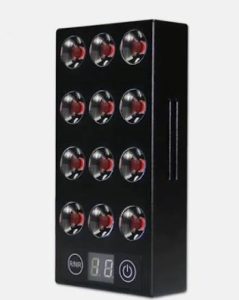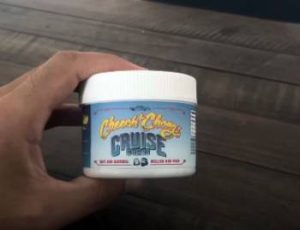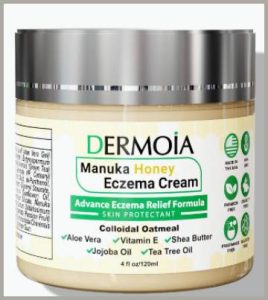If you’re pursuing a career in Clinical Laboratory Science or preparing for your MLS or MLT exams, I highly recommend investing in the Clinical Laboratory Science Review: A Bottom Line Approach, 5th Edition by Pasty Jarreau.
This book has been a game-changer for many, myself included, by offering a straightforward, concise, and well-organized way to study. Whether you’re just starting the program or getting ready for the board exams, this review book helps streamline your studies.
The book provides a clear breakdown of complex material, making it easier to remember crucial information. I found it especially helpful in organizing all the knowledge required for the exams. This resource, combined with other review materials, can make all the difference when it comes to feeling confident in your understanding and passing the tests.
What Makes This Book Special?
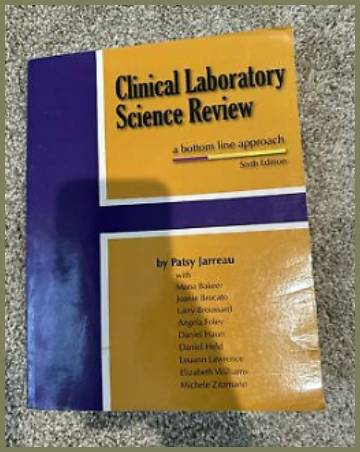
The Clinical Laboratory Science Review stands out because of its structured approach to covering a vast array of topics. As a student, it can often be overwhelming to sift through tons of information. The book condenses the key material, presenting it in bite-sized chunks that are easy to digest. Each chapter is organized by topics that are critical to the MLS and MLT exams, from hematology to microbiology, immunology, and clinical chemistry.
What truly makes this book unique, in my experience, is its ability to reinforce concepts with quirky tips, mnemonic devices, and visual aids. I remember studying some of the more complicated subjects, like blood banking, and these helpful images and funny sayings made remembering complex concepts much easier. This blend of humor and clarity helped me to not only prepare for the exam but also retain the information in the long term.
Furthermore, Jarreau’s writing style is approachable and easy to understand. The technical jargon that often makes textbooks a chore to read is kept to a minimum. Instead, the book’s tone is conversational, which makes studying feel less like a task and more like a meaningful conversation with a knowledgeable mentor.
What’s Inside the Book?
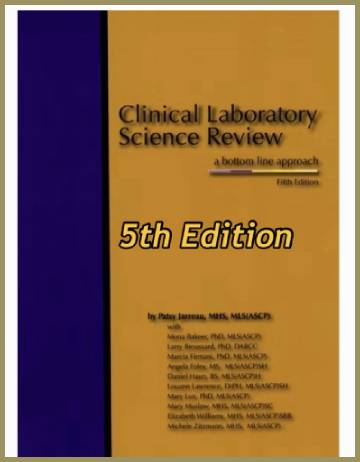
The 5th edition of this review book features a comprehensive overview of essential clinical laboratory science topics. As I flipped through the chapters, I found that the content was organized logically, which really helped in building a foundation of knowledge. Some of the key chapters cover areas such as:
- Hematology and Coagulation: This chapter is especially useful for understanding the components of blood, blood cell analysis, and clotting mechanisms, which are key concepts for the exams.
- Microbiology: It breaks down pathogens and the mechanisms behind infections, providing clinical examples that made understanding easier.
- Immunology and Serology: This is crucial for diagnostic laboratory work, and the review offers great visual cues and explanations of complex processes.
- Clinical Chemistry: This section walks you through the biochemistry behind blood tests, enzyme reactions, and the interpretation of lab results.
Each section is followed by review questions that reflect the style and complexity of actual exam questions. These questions helped me test my understanding and pinpoint areas that needed more focus.
How to Get the Most Out of This Review Book
One of the most common pieces of advice I can offer about using this book effectively is to not just read it, but actively engage with it. Here’s what worked best for me:
- Read with Purpose: Don’t skim through the material. As you read each chapter, actively ask yourself questions. What do you not understand? What seems important? Take the time to write down key points.
- Use Mnemonics: The book does a great job incorporating mnemonics and silly phrases that will make complex material stick. Repeat them out loud, write them down, and use them to jog your memory.
- Practice with Review Questions: After reading each chapter, tackle the review questions at the end. This is where I saw the most improvement in my understanding. Not only do they reinforce what you’ve just studied, but they prepare you for the format of the exam.
- Supplement with Other Resources: While this book is fantastic, it’s always helpful to use other resources to reinforce what you’ve learned. I supplemented my studying with the BOC study guide, flashcards, and practice exams from Labce. Combining these with the book helped solidify my foundation.
- Stay Consistent: The key to mastering clinical laboratory science material is consistency. Don’t try to cram everything into a week. Spread out your study sessions over several months to avoid burnout and truly absorb the material.
Also Read: My Thoughts On Dr. Stephanie’s Carb and Sugar Blocker
Pros & Cons of the Clinical Laboratory Science Review Book
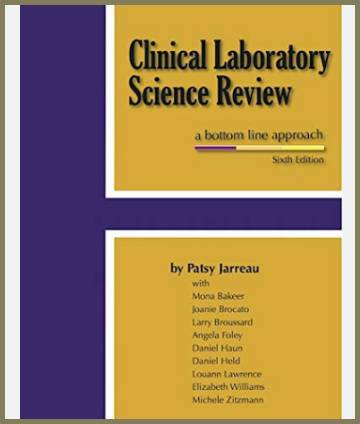
Pros:
- Clear and Concise: The book’s layout is straightforward, and the explanations are easy to follow. This makes it especially useful for people like me who struggle with dense medical terminology.
- Helpful Visuals and Mnemonics: The inclusion of visual aids, funny phrases, and memory tricks made studying feel less tedious.
- Comprehensive Coverage: The book offers a broad range of topics necessary for both MLS and MLT exams.
- Approachable Writing Style: Jarreau’s tone is friendly, and her writing feels like having a mentor explain the content to you, which was motivating for me.
- Great for Reinforcement: If you’ve already studied the material in class, this book is perfect for reinforcing key concepts before the exam.
Cons:
- Not Enough Depth for In-Depth Study: While the book is great for reviewing, if you want to dive deeper into certain topics, you may need additional textbooks or references.
- May Not Suit Everyone’s Learning Style: For those who prefer a more traditional textbook or want a more in-depth approach to clinical laboratory science, this review book may not be sufficient on its own.
- Lack of Interactive Features: The book is a printed guide, so it lacks interactive components that modern learners often prefer, such as videos or online quizzes.
- Requires Consistency: You have to commit time and energy to make the most of the book. This might not be ideal for someone who’s looking for a quick fix.
Clinical Laboratory Science Review Book Vs. Other Brands
Clinical Laboratory Science Review Book by Pasty Jarreau Vs. Davis’s MLS Review
When comparing Clinical Laboratory Science Review by Pasty Jarreau with Davis’s MLS Review, it’s clear that both are strong contenders for exam preparation. Jarreau’s book stands out for its straightforward, conversational style, making it easy to digest complex information. Its quirky mnemonics and simple explanations help reinforce concepts quickly. In contrast, Davis’s MLS Review offers more in-depth content, providing a thorough breakdown of every topic, but it can be overwhelming for students looking for a concise study guide. If you prefer a more detailed approach and are prepared to commit more time to study, Davis’s Review is a great choice. However, if you want an approachable, less daunting resource to quickly grasp key concepts, Jarreau’s review book is ideal.
- Clinical Laboratory Science Review Book by Pasty Jarreau Vs. The BOC Study Guide
The BOC Study Guide is another popular review tool, especially for students preparing specifically for the Board of Certification (BOC) exam. It’s incredibly comprehensive, offering hundreds of practice questions and detailed explanations. However, while The BOC Study Guide is invaluable for mimicking the exact test format, it can be overwhelming and doesn’t always present the material in the most user-friendly way. On the other hand, Clinical Laboratory Science Review by Jarreau is more digestible for students looking for a clear breakdown of essential concepts. It’s great for reinforcing what you’ve already learned and offers engaging tips to make studying more manageable. If you prefer an extensive question bank and deeper content, go for The BOC Study Guide, but if you’re looking for clarity and ease of use, Jarreau’s review is more suited for you.
- Clinical Laboratory Science Review Book by Pasty Jarreau Vs. MLS Exam Prep
The MLS Exam Prep book provides a similar approach to Jarreau’s review book, offering both study material and practice questions. However, what sets Jarreau’s book apart is its simplicity and focus on essential information, making it particularly helpful for visual learners with its use of mnemonics and visual aids. MLS Exam Prep tends to be more dense and focused on memorization techniques, which can be a bit much for some learners. For students who want a quick, clear, and engaging study guide to help them get through their material effectively, Jarreau’s review book is a great choice. If you need a more traditional exam prep book with lots of question banks, MLS Exam Prep might work better.
- Clinical Laboratory Science Review Book by Pasty Jarreau Vs. LabCE Exam Simulators
LabCE Exam Simulators is an online resource that offers simulated exams to help students prepare for the MLS and MLT certifications. While LabCE focuses entirely on practice exams, Jarreau’s Clinical Laboratory Science Review offers a more comprehensive study guide with explanations of key concepts. Using both together is ideal—Jarreau’s book provides a solid understanding of the material, and LabCE offers realistic practice exams to help you apply that knowledge in a test setting. If you’re looking for interactive, exam-style practice, LabCE is invaluable, but for those who need a more structured, traditional approach to learning, Jarreau’s review is better suited.
- Clinical Laboratory Science Review Book by Pasty Jarreau Vs. MLT Exam Secrets Study Guide
MLT Exam Secrets Study Guide is another popular option that offers a great balance of review content and test-taking strategies. It’s useful for students who need a more structured approach to learning, with detailed breakdowns of each subject area. However, unlike Jarreau’s book, it lacks the clear, concise, and approachable writing style that makes Jarreau’s review book easy to follow. The MLT Exam Secrets guide can feel more like a traditional textbook, which may not be ideal for students who are looking for something a bit more engaging and accessible. If you prefer straightforward explanations and easy-to-follow material, Jarreau’s book would be a better fit. However, if you want a guide that focuses heavily on test-taking strategies and detailed content, MLT Exam Secrets may suit your needs.
Also Read: My Thoughts On Dr Michelle Sands Hormone Harmony
Frequently Asked Questions (FAQs)
Yes, clinical laboratory science is a rewarding and stable career with opportunities in various medical settings. The demand for laboratory professionals is growing, and the work is essential for accurate diagnosis and patient care.
With a clinical laboratory science degree, you can work as a medical laboratory scientist (MLS), perform diagnostic testing, manage laboratory operations, or even teach. You can also pursue specialized certifications or leadership roles in healthcare settings.
A typical Clinical Laboratory Science (CLS) program lasts about 4 years if you pursue it full-time at a university. There are also accelerated options available for those with prior healthcare experience.
Being a Medical Laboratory Scientist (MLS) is worth it for those who enjoy science, problem-solving, and working in healthcare. It offers job stability, the potential for growth, and the satisfaction of playing a critical role in patient care.
Final Thoughts
In conclusion, the Clinical Laboratory Science Review book by Pasty Jarreau is an indispensable resource for anyone preparing for the MLS or MLT exams. It’s clear, concise, and provides a solid foundation in the most crucial areas of clinical laboratory science. While it’s not a one-size-fits-all solution, its accessible approach and practical tips make it a must-have study companion. Whether you’re just starting your program or getting ready to take your board exams, this book is an excellent investment in your success.

